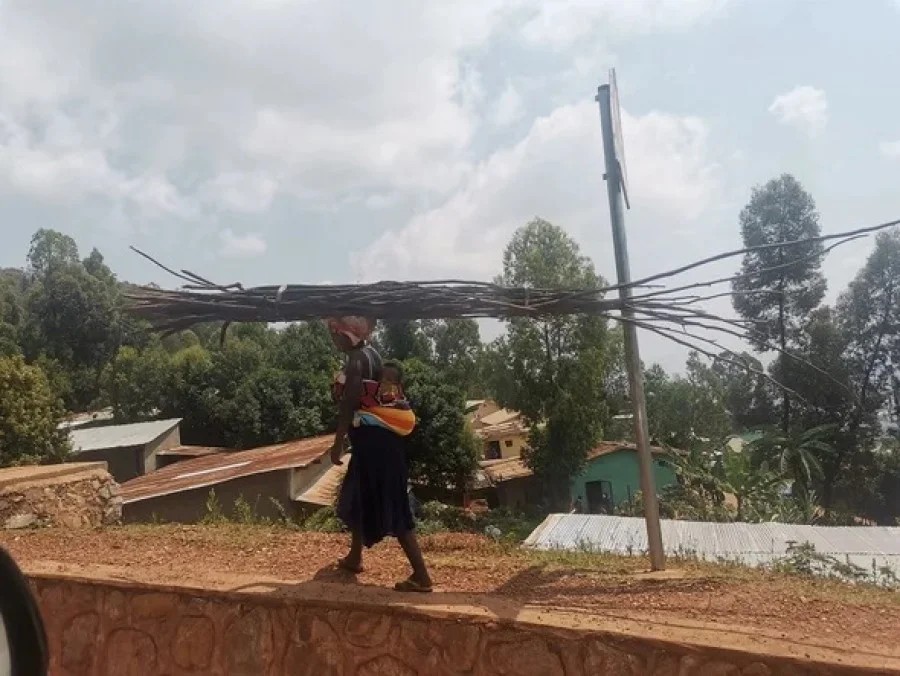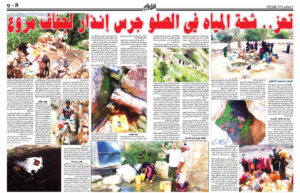Written by: Hadir Al-Hadary
Quoted from a site for science.. Link Original report published on April 28, 2022
In the city of Dar es Salaam, the former capital of the African nation of Tanzania, Luciana Mandia wakes up every morning, presses a kiss on the face of her only child before she goes to work in one of the shops, and at midday she quickly returns home to spend several hours cooking food for her family.
“Luciana” - 37 years old - used to use charcoal as a primary fuel source for cooking, like the majority of residents in her city who face great economic difficulties, so buying a gas or electric stove is a luxury that they cannot afford, as she says in her interview with “ “For the record.”
When Luciana cooks food, the smoke resulting from burning charcoal causes irritation in her eyes and chest and causes her to cough. The smoke increases with parts of the charcoal that have not burned well, but she cannot stay away from the stove; Coal often does not produce enough heat to cook the food, so you have to add more until you finish cooking.
Statistics show that Tanzania is one of several countries where only less than 5% of the population has access to clean fuel for cooking, according to a report issued by the World Health Organization last June. The report also found that the top twenty countries with this problem include 81% of the world’s deprived population. In terms of access to clean cooking fuels and technologies, the following countries are at the forefront: the Republic of the Congo, Ethiopia, Madagascar, Mozambique, Niger, Uganda and Tanzania.
Pure female roles
In developing countries, the roles of cooking, collecting firewood, and preparing fuel are closely linked to women, with serious implications for their health and social life; Cooking using open fires contaminated with kerosene fuel, charcoal, firewood, and agricultural waste causes indoor air pollution in homes, resulting in several diseases, most notably pneumonia, stroke, ischemic heart disease, chronic obstructive pulmonary disease, and lung cancer, which leads to the death of about 3.8 million people annually. The majority of the impact falls on women and children, according to the World Health Organization.
“Luciana” is one of the 2.6 billion people in the world who still cook their food with polluted fuel. She was unable to achieve her simple dream of having a gas-powered stove in order to save the long time she spends making her food, and to save her health from troubles. As for the dream of electricity, it is... She does not have the luxury of thinking about it, because she cannot imagine bearing its high cost.
When solid fuel is burned inside the home, it produces fine particles that penetrate the body’s mucous membranes and enter the blood, causing brain diseases, strokes, and respiratory disorders, leading to congestion, coughing, and eye infections, as Ragia El-Gizawi, responsible for the health and environment file at the Egyptian Initiative for Personal Rights, says in Exclusive statements to “For Information”: Given that women and children usually spend more time at home, they are the groups most exposed and affected by these diseases, in addition to bearing the burdens related to collecting firewood for the cooking process and the possibility of being exposed to violence or sexual harassment during their trips to... Friday.
According to Al-Jizawi, there is a relationship proven by scientific research between air pollution and the risk of developing lung cancer and chest allergies, and the degree of risk increases inside the home. Because the air in it is not sufficiently renewed compared to the air outside the home, at the same time, pollution carries risks for everyone, and fossil fuels contribute to increasing these carbon emissions and thus lead to higher pollution rates.
This fate was faced by Luciana's younger sister after she contracted a lung disease as a result of inhaling heavy coal smoke. She works in cooking cassava (a potato-like plant) using charcoal and wood and then sells it to passers-by. Thousands of women in her city follow suit, where they spend long hours cooking. They sell food and baked goods in the same way at public transportation stations and crowded places to earn a living, she says.
Violating societal equity for women
In the crisis of unclean cooking, the inequity that women endure is not limited to health impacts, but also includes the consumption of their time in the process of collecting and preparing fuel, traveling long distances or perhaps navigating difficult terrain to collect and then chop wood, or making dung balls and preparing stoves, as well as It also includes cleaning utensils and washing clothes after cooking, according to a report in which the Clean Cooking Alliance, the World Bank, and several others participated. The report, issued at the end of last March, conducted a gender analysis in seven African countries and found that women spend, on average, 2.7 hours a day cooking, compared to only 0.35 of an hour for men. This shows the extent of the responsibility placed on them, and a report from the World Health Organization agreed with it, which found that the use of fuel Being unclean disrupts societal equity for women; Collecting fuel causes muscle damage and takes up a significant amount of their time, preventing them from performing other meaningful activities such as income generation, and in the process they may face risks of physical harm and violence.
This effect represents part of the suffering of Luciana, whose day is divided between work and household tasks, as she is forced to spend more time and additional effort to cook her food in the traditional way, while she could have had additional hours to complete other household tasks, entertainment, or play with her child if It had an electric or gas stove.
More than 40% of the world's population does not have access to clean fuel for cooking, and 10% of them do not have access to electricity, according to Patricia Espinoz, Executive Secretary of the United Nations Framework Convention on Climate Change, and this comes with unfortunate impacts on the health of women and children and the environment in which they live, explained during Her speech at the Berlin Energy Transition Conference last month: “While climate change affects everyone in the world, not everyone is affected to the same extent. Women are the most affected, and their struggle to obtain clean fuel for cooking is one example of this.”
She continued: “A fair transition to clean energy and enabling access to it is an essential point when we talk about climate change. How can we ask a developing country to stop using coal if we do not provide it with alternative solutions? We must also recognize that climate change and development are one agenda and cannot be separated.”
Providing energy to women
Increasing funding directed to investing in “access to energy for women” was one of the demands of speakers at the conference. Sheila Obrucha, director of the “Energia” organization concerned with gender equality in access to energy, said during her speech: There is a need to increase funding to end the energy poverty that she suffers from. Women by providing energy services while enabling them to access them, and providing clean cooking fuels are at the top of women’s needs. We must also work to achieve fair participation for them in the field of energy and in decision-making places, and provide jobs in the fields of renewable energy and in traditional fields as well.
The world loses $2.4 trillion annually due to unclean cooking fuel, with more than half of that amount ($1.4 trillion annually) linked to health impacts, $0.2 trillion in climate impacts, and $0.8 trillion in lost productivity from women, according to the bank’s report. International on Access to Cooking Fuel Services in 2020.
In the town of Lucena, the average price of a small plate of charcoal is about half a dollar, meaning that she spends about 15 dollars a month to buy fuel for cooking, which is the only price she can afford compared to her monthly salary, so the women in her town not only need clean fuel available, but They need to be empowered economically so that their purchase and use becomes possible rather than out of reach.
“Luciana’s” experience differs from that of Hend Arif (a pseudonym), who lives in the village of Ezbet El-Minshawy in Gharbia Governorate in Egypt, as she has a gas stove that allows her to cook cleanly, but every few days she is forced to use the “municipal oven” that is lit with wood and “Corn mills” to relieve pressure on the gas pipeline that she buys every month for eighty-five Egyptian pounds (about 4.5 dollars).
Hind, 33 years old, uses this oven to make baked goods and some types of food that take a long time to cook and may cause the contents of the tube to run out quickly. Although the oven and the smoke resulting from it have not caused her health problems so far, there is almost agreement. It is not written among the women in her village that it is not appropriate to use a local oven for those who suffer from chest or eye health problems.
This investigation was prepared as part of an initiative MediaLab Environment, a project of the French Agency for Media Development CFI.
Photo: A woman collects firewood in Kigali, Rwanda Credit: Hadeer Elhadary





